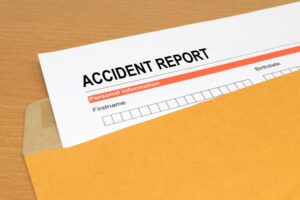How Our Lawyers Handle a GEICO Injury Claim
Did you suffer injuries in a car accident? Are you facing a stack of costly medical bills, lost income, and uncertainty about what the future holds? If you need to file an injury claim with GEICO, there are several important considerations that you should know — factors that the GEICO claims process that could make a significant difference in the compensation you receive.
The process of filing a claim can be daunting, and obtaining a fair settlement on your own can be incredibly difficult, but you don’t have to do it alone. An experienced car accident attorney can thoroughly investigate the accident, gather strong evidence, and build a solid argument to support your personal injury claim.
Lawyers understand the tactics insurance companies use to minimize payouts and can confidently counter these to pursue the compensation you deserve. Keep reading to learn more about how our lawyers handle a GEICO injury claim.
A Little Background on GEICO
GEICO was formed in 1936 as the Government Employees Insurance Company to provide auto insurance to federal government employees. The name has since changed, as has its mission, but today it is the third-largest car insurance company in the U.S. The company also offers a spectrum of other insurance policies, such as home, flood, business, and general liability insurance, to name just a few.
With more than 30 million cars covered by a GEICO policy, there is a good chance you will have to deal with a GEICO claims adjuster if you are ever involved in an accident caused by someone else’s negligence. You may even be a GEICO policyholder yourself.
Request A Free Consultation Today!
How Do You File a GEICO Claim After an Accident?

No two injury claims are alike, but the overall process of filing a GEICO claim is essentially the same after any accident.
Here are the typical stages of the GEICO injury claims process:
- Reporting the Accident: Your first step is to inform GEICO about the accident. You should do this as soon as possible by calling them directly or using the GEICO mobile app. Provide all the details of the incident, including the date, time, location, and how it happened. Be ready to give information about other parties in the accident and the harm you suffered.
- Evaluating the Claim: After you report the accident, GEICO will assign a claims adjuster to your case. This person’s job is to assess the claim by reviewing the accident report, inspecting vehicle damage, and evaluating your injuries. The GEICO claims adjuster will determine whether you have a valid claim and how much GEICO should pay based on your policy coverage.
- Documenting and Collecting Evidence: While the claims adjuster is doing their part to get your claim started, you should gather all available evidence. This includes photos of the accident scene, vehicle damage, and any visible injuries you sustained. Collect names and contact information from any witnesses. All of this information will support your claim.
- Reviewing the Claim: GEICO will review all the evidence and documents you and the adjuster have gathered. They will consider your policy details, your injuries, and any expenses you have incurred. They will then decide whether your policy will cover your claim and how much to pay. GEICO might also negotiate with other parties in the accident or their insurers.
- Settling the Claim: Assuming you have a valid claim, GEICO will offer you a settlement amount once it completes its review. This is the money they believe your injuries and related losses are worth, given the available evidence. Carefully review this offer to make sure it covers all your expenses. If you agree with their offer, you will sign a release form.
- Closing the Claim: After you agree to a settlement and sign the necessary documents, GEICO will close your claim. You’ll receive the amount of compensation you accepted for your injuries and expenses in the settlement. Once you close your claim, you cannot seek any additional payment for this particular incident, so be sure the settlement is fair before you sign anything.
If the settlement offer you receive from GEICO does not adequately cover your losses or if there’s a dispute over the claim, you might choose to pursue litigation.
In this case, you would file a lawsuit against GEICO or the party at fault for the accident. If you don’t already have a lawyer at this point, you will need to hire an experienced injury attorney to represent you.
The litigation process involves filing legal documents, presenting evidence, and possibly going to trial. This stage is often lengthy and complex, so it’s vital to have professional legal advice.
Your attorney can navigate the court system and advocate for your best interests every step of the way. During litigation, both sides have opportunities to negotiate before the case goes to trial for a final decision.
If you win the case, the court will award you damages (money), which GEICO or the at-fault party’s insurance will have to pay. If you receive this type of award, your attorney can help you arrange the payment in a way that works for you.
This could mean a lump-sum payout, where you get all the money at once, or a structured settlement, where you receive the money in installments over time.
What Types of Compensation Can I Get from a GEICO Claim?
The types and amounts of compensation available to you will vary depending on your case.
Depending on the circumstances, you could include the following types of compensable losses in your GEICO injury claim:
- Past and future medical expenses you incur due to the accident
- Incidental, out-of-pocket costs, such as medical travel expenses
- Income losses from any work absences due to the accident
- Projected losses in future earning capacity due to long-term impairments
- Subjective losses like pain, suffering, and reduced quality of life
What Factors Will GEICO Consider When Valuing My Claim?
When GEICO evaluates your injury claim, it considers various factors that can affect the value of your claim. Understanding these factors makes it easier to see how GEICO determines the amount of compensation you might receive.
The Severity of Your Injuries
GEICO will assess the gravity of your injuries since more severe injuries typically result in higher compensation. They will examine medical reports, the types of injuries you sustained, and the treatments you need. They also consider your injuries’ immediate and long-term effects, including any need for medical devices, surgeries, or extended hospital stays.
This detailed evaluation allows them to estimate your medical expenses and the compensation you need for your recovery.
Need for Long-Term Medical Care
If your injuries require extensive medical care, such as ongoing therapy or future medical interventions, GEICO takes this into consideration, too. They will evaluate doctors’ opinions and the likelihood of future medical issues stemming from your injuries.
They estimate the costs of potential surgeries, long-term treatments, and other long-term care requirements. They include them in their valuation to ensure you have coverage for future medical needs.
Work Absence Due to Injuries
GEICO also calculates the financial effect of any work you miss due to the accident. They look at your pay rate and any earnings you lose during any period you’re absent from work. Moreover, they consider the effect of your injuries and absences on benefits, such as lost vacation or sick days you had to use while recuperating.
If your injuries affect your ability to return to work in the same capacity or if a job change is necessary, GEICO will also account for these factors.
Effect on Future Earning Capacity
The potential change in your earning capacity due to your injuries is another crucial consideration for GEICO. They will assess how your injuries might prevent you from returning to your current job or finding any other job in the future. This evaluation includes the possibility of reduced hours, a less demanding role, or retraining to enter a different field.
Compensation for these aspects aims to cover any losses in your future earning capacity and opportunities due to permanent disabilities or impairments.
Effect on Quality of Life

GEICO also evaluates how your injuries disrupt your lifestyle and routines. They consider any new limitations on your ability to engage in social activities, hobbies, and other pleasures of life.
If your injuries prevent you from performing daily tasks independently or participating in events that were once routine, GEICO factors this into your compensation for diminished quality of life.
Availability of Relevant Evidence
The strength of your claim also relies on the amount and quality of evidence you provide to support it.
GEICO will closely review all your documentation, including photos of the accident scene, detailed medical records, and any witness accounts. The more comprehensive and convincing your evidence is, the more accurately GEICO can evaluate and justify the compensation for your claim.
Clarity and Distribution of Liability
In determining the value of your claim, GEICO will examine who is at fault and to what extent. They will analyze accident reports, witness statements, and any traffic citations resulting from the collision.
Your claim’s value could increase if the evidence clearly demonstrates that the other party’s at fault. However, if the evidence is weak or inconclusive, GEICO might adjust your claim’s value accordingly.
Limits of the Available Insurance Policy
Insurance policies have maximum payout limits that restrict the amount of money you can receive when you file a claim. Any time you claim compensation, GEICO reviews the policy details to establish the maximum payout available for your claim.
If your damages exceed the policy limits, they might offer the maximum payout, but their offer will always remain within the policy cap.
Whether You Have Legal Representation
Hiring a lawyer to represent you after an accident signifies to GEICO that you are serious about getting fair compensation. Lawyers bring significant legal knowledge and experience in negotiating with insurance companies and can often argue for a much higher settlement than accident victims could get on their own.
GEICO might also consider the likelihood of a lawsuit when a policyholder hires an attorney. Having a lawyer on your side can nudge them to increase their settlement offers to avoid a lengthy, costly lawsuit.
What Should You Say or Do When You Talk to GEICO?
The things you say and do when you interact with GEICO can play a role in the outcome of your injury claim.
Here are some things to keep in mind any time you speak with a GEICO representative:
- Provide Accurate Information: Offer precise details about your injuries and the damage to your vehicle. Ensure all information is accurate to avoid any discrepancies that could hurt your claim.
- State Your Needs: If you have specific needs or concerns, such as a rental car or specialized care, inform GEICO. Being upfront about your needs is the best way to ensure you have the resources to address them.
- Communicate Clearly: Speak clearly and provide thorough responses when discussing the accident with your claims adjuster. Answer their questions to the best of your knowledge without speculating or guessing.
- Be Honest: Always tell the truth about the accident and your injuries. Honesty is crucial for a valid claim and helps you build credibility with the insurance adjuster.
What Should You NOT Say or Do When You Talk to GEICO?
Just as important as what you say and do is what you avoid saying or doing when you communicate with GEICO.
Here’s what not to do:
- Do Not Exaggerate: Do not overstate your injuries or expenses. Exaggeration could undermine your credibility and harm your claim.
- Do Not Admit Fault: Do not make any statements that GEICO could interpret as an admission of fault for the accident.
- Do Not Provide Unnecessary Information: Do not offer more information than necessary. Stick to the facts of the accident and your injuries.
- Do Not Speculate: When speaking with the claims adjuster, do not guess or make speculative statements about the accident or your injuries. If you aren’t sure of an answer, simply admit you don’t know and move on.
- Do Not Sign Anything Without Legal Advice: Do not sign any documents or releases from GEICO without thoroughly reviewing the terms with your lawyer. Once you sign, you might forfeit your right to seek further compensation.
- Do Not Post on Social Media: Refrain from posting details or discussing the accident or your health on social media platforms, as GEICO could use this information against you.
Do I Need a Lawyer to File a GEICO Injury Claim?

Yes. Even if your injuries are relatively minor and there’s plenty of evidence, you should always hire a personal injury lawyer after a car accident. Your attorney can use their knowledge and experience to handle every aspect of your claim while you recover. They know how to steer insurance negotiations and avoid common pitfalls that could decrease your claim’s value.
Car accident attorneys can fight to maximize your compensation and handle your communication with GEICO. They can work relentlessly to gather and present compelling evidence and advise you throughout the claim process. With their support, you can concentrate on your recovery, knowing they are actively working toward a favorable outcome for your claim.
Free Consultation
We Are Here For You 24/7
Reviews
– Elissa M.
“Really pleased with Boohoff Law! Received immediate responses when I had any questions. Treated amazingly by all staff … made this process a true breeze!”
– Caitlyn M.
– Brandy K.
Related Posts
Steps to Take After a Drunk Driver Hits Your Vehicle in Seattle
What Compensation Can You Claim for Severe Burn Injuries
What to Do After Being Injured in a Parking Lot Accident in Seattle
Recovery is personal.
We’re here for you.
You're better off with Boohoff.











The information on this website is for general information purposes only. Nothing on this site should be taken as legal advice for any individual case or situation. This information is not intended to create, and receipt or viewing does not constitute, an attorney-client relationship.
available 24/7
(877) 999-9999
